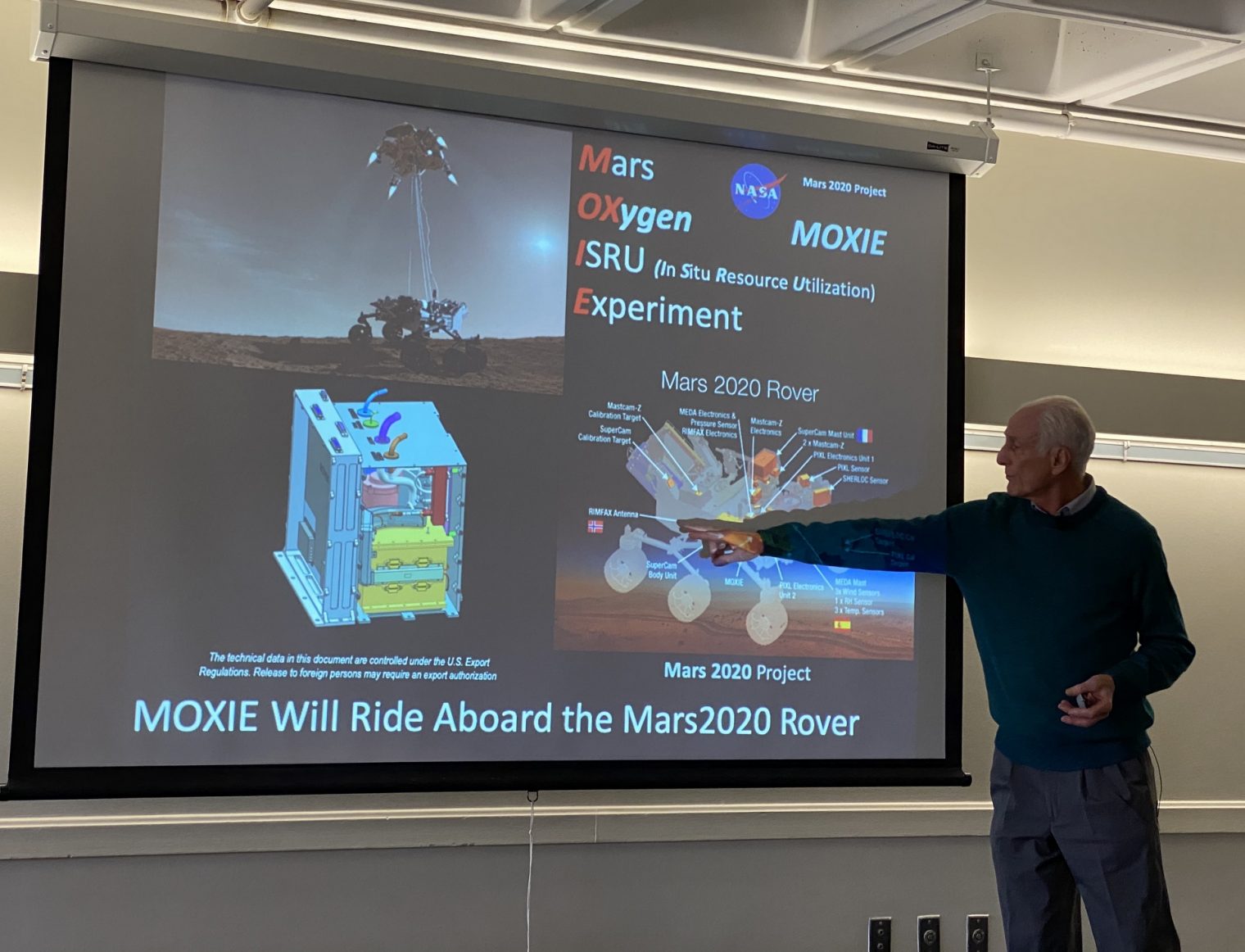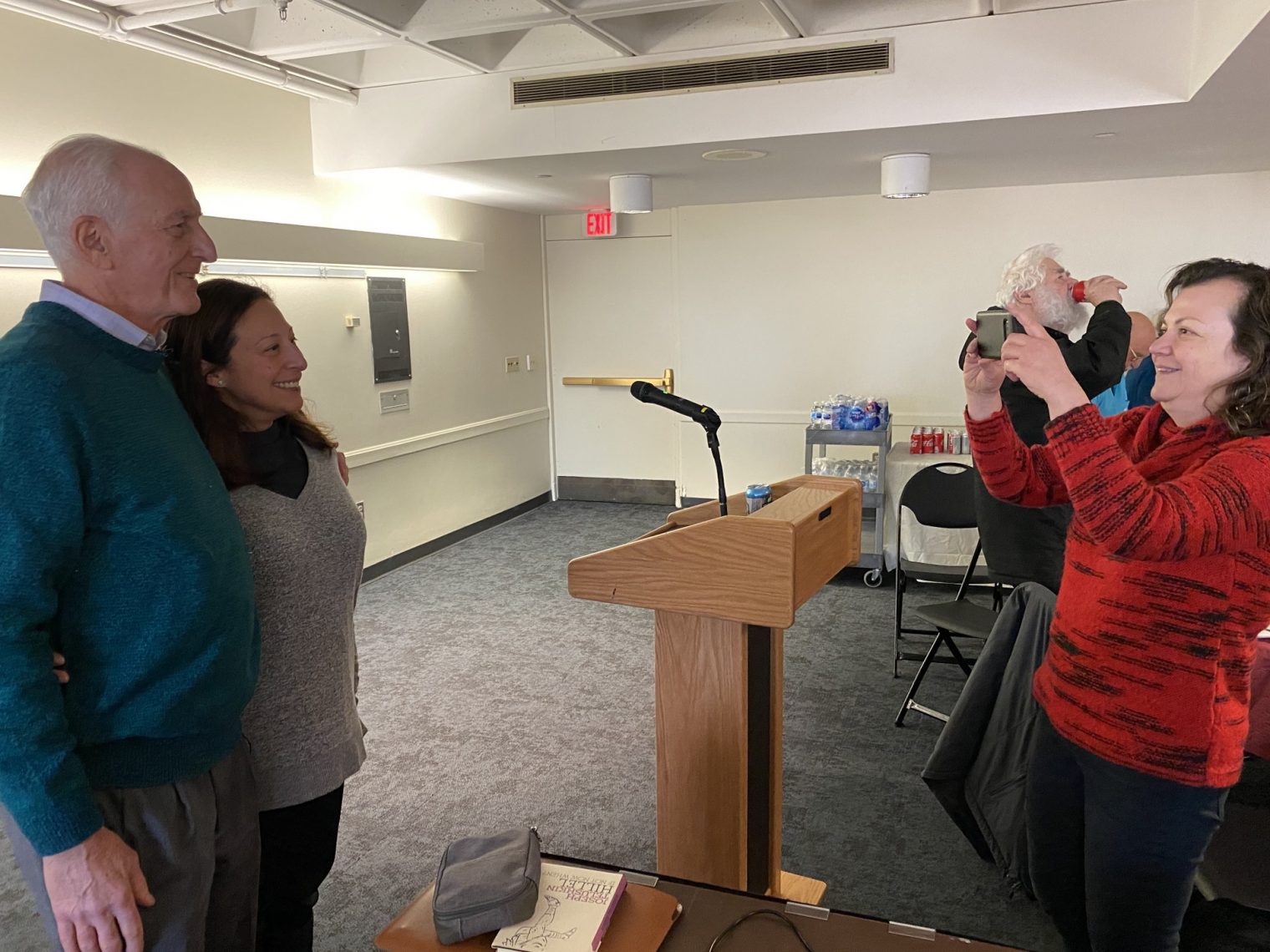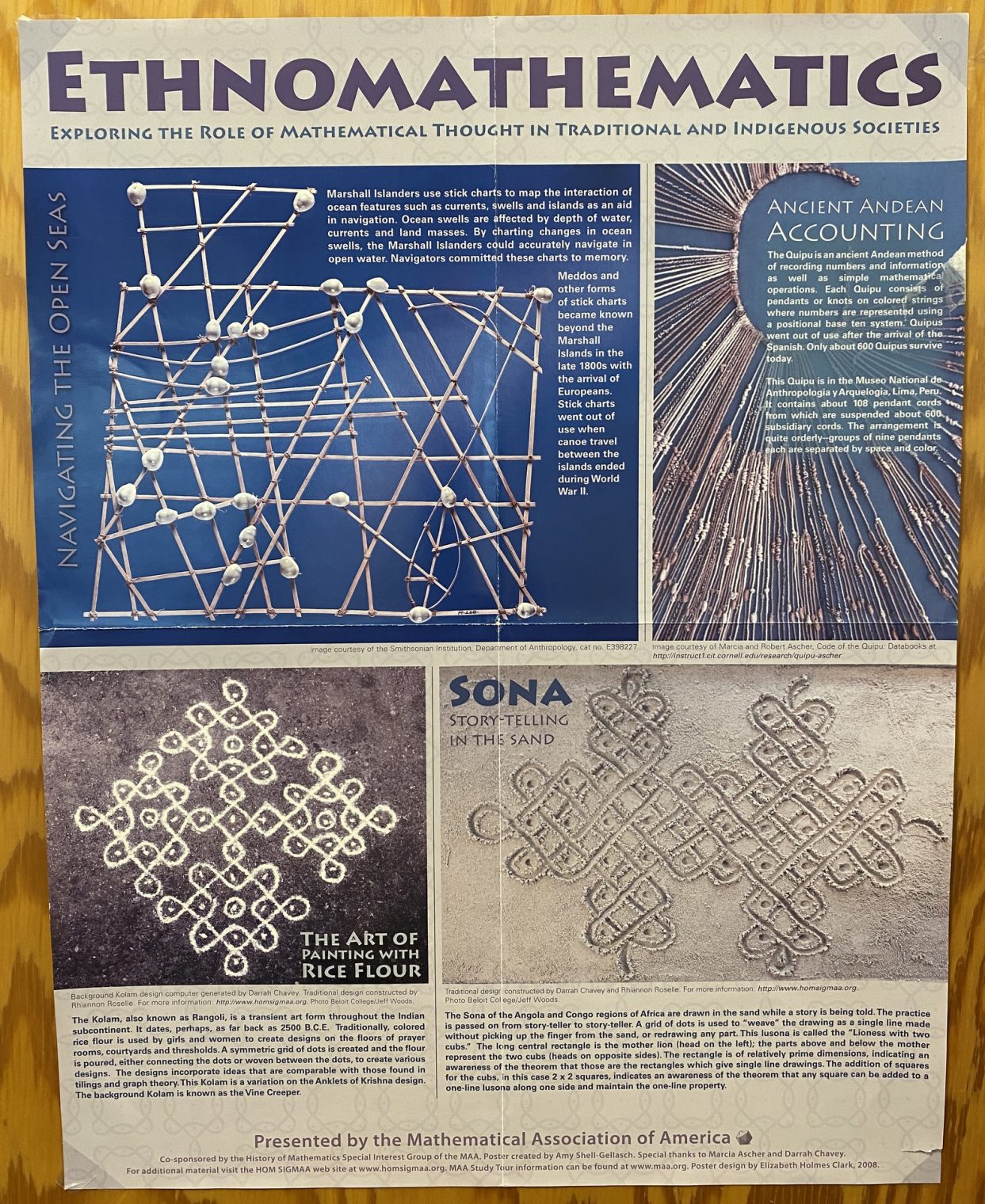From a Valentine’s Day talk by Jeffrey Hoffman, an astronaut-turned-professor who is now part of an effort to mine oxygen out of the Martian atmosphere…. If the MOXIE system works and Blue Origin gets humans to Mars, they can come back without having had to pack 80 percent of their rocket fuel for the trip home.
Professor Hoffman explained that, though there is plenty of water in the Martian crust it takes too much energy to extract it. Thus, the plan is to “mine” the atmosphere, which is 96 percent CO2 (should be toasty warm from the greenhouse effect, except that atmospheric pressure is comparable at the Martian surface to what we have at 100,000′ above sea level).
Hoffman and collaborators’ experiment will launch in July 2020 and land in February 2021. The Mars journey will also be 7 months for humans, kind of like being on a cruise ship in Asia right now. The shocking news for movie fans is that The Martian is not scientifically accurate. The dramatic wind that forces an evacuation and is blowing stuff around would have to move at 1,000 mph to have enough force, given the thin atmosphere. In fact, the highest recorded winds on Mars are roughly 60 mph.
As with other astronauts I’ve talked to recently, Hoffman is not a fan of centralized government-run rocketry. Regarding the SLS, which promises to cost taxpayers $20 billion at least: “Maybe they will launch it a few times. It is Saturn V technology.” In his view, SpaceX and Blue Origin are where the innovation happens. The government “monopoly” had cost us decades of potential progress.
One thing I learned: this next Mars mission will include a helicopter! Also, landing on Mars is a combination of the worst features of the Earth and Moon. There is the friction from entering the atmosphere, as on Earth, but not enough atmosphere to slow down with wings or a regular parachute.
Sidenote: Hoffman first came to MIT because of Walter Lewin, whose physics lectures are now securely in a memory hole due to #MeToo issues.
Hoffman flew on five Shuttle missions, logged 1,211 hours in space, and did multiple spacewalks, including one to fix the Hubble telescope. An example of “bravery”? Perhaps not. There’s a talk on real bravery today at 4 pm:
What else do we find in the corridors at MIT? “The Trump administration is the noxious product of the capitalist system” (but didn’t most of the Wall Street capitalists support Hillary?)
A poster on “ethnomathematics”:
(If these “traditional and indigenous societies” are doing interesting stuff, why isn’t it just “mathematics”? Why do they need a special numbers nerdism ghetto?)
We crashed a Valentine’s Day party for a group of PhD students in Electrical Engineering and Computer Science. Hollywood-style background:
The future engineering PhDs pour themselves coffee:
Circling back to Professor Hoffman… As with other retired astronauts I have met, this guy is incredibly fit and sharp at age 75. Makes one wonder why humans age at all. If we can live to 75 with hardly any deficits accumulating, why can’t we live to 750? If nearly all of us drop dead by 100, why don’t we drop dead at 10? Most of our cells have to go through at least one replacement cycle by age 10, right?







> If nearly all of us drop dead by 100, why don’t we drop dead at 10?
Some people with progeria do.
“As there is no known cure, few people with progeria exceed 13 years of age.[43] At least 90 percent of patients die from complications of atherosclerosis, such as heart attack or stroke.[44]
Mental development is not adversely affected; in fact, intelligence tends to be average to above average.[45] With respect to the features of aging that progeria appears to manifest, the development of symptoms is comparable to aging at a rate eight to ten times faster than normal.”
It’s caused by de novo mutations in a gene encoding a specific protein and is not inherited because affected individuals perish. A little bit older than 10, usually, but not much longer.
https://en.wikipedia.org/wiki/Progeria#Cause
Wonder if MIT is closer to Blue Origin than SpaceX. SpaceX does have a lot of MIT graduates like all the top companies, but the blog tends to emphasize Blue Origin.
Longevity is limited to promote genetic diversity, otherwise we’d all be the 1st iteration at ages of millions. It could be another advantage of women selecting men of lower fitness, besides forming the tribe structure.
With all respect for the bravery and abilities of Jeffrey Hoffman, this –
> The Mars journey will also be 7 months…
– does not appeal.
1. Spend 7 months confined in a small metal box.
2. Land on Mars, where you’ll live in… another box (or is it still the same one?). Plus the occasional short walk in an all-enveloping suit.
3. Spend 7 more months confined in the small metal box.
4. If you survive all that and remain sane, return to Earth for celebrity status.
Wouldn’t a willingness to sign up for that disqualify you on mental health grounds? A cruise ship in Asia for me, please!
Philip asked:
“Makes one wonder why humans age at all. If we can live to 75 with hardly any deficits accumulating, why can’t we live to 750?”
Here are two commonly given reasons related to DNA:
1. Telomere shortening
“Telomere length shortens with age. Progressive shortening of telomeres leads to senescence, apoptosis, or oncogenic transformation of somatic cells, affecting the health and lifespan of an individual. ”
https://www.ncbi.nlm.nih.gov/pmc/articles/PMC3370421/
2. Methylation Changes
Age-associated changes to the mammalian DNA methylome are well documented and thought to promote diseases of aging, such as cancer.
https://www.cell.com/molecular-cell/pdf/S1097-2765(18)30642-7.pdf
Philip said:
“As with other retired astronauts I have met, this guy is incredibly fit and sharp at age 75”.
One possibility for that is selection bias: sharp, fit astronauts may spend more time out meeting the public than sickly astronauts.
For deep space visitors, the evidence has not been so good:
“Apollo Lunar Astronauts Show Higher Cardiovascular Disease Mortality: Possible Deep Space Radiation Effects on the Vascular Endothelium”
https://www.nature.com/articles/srep29901
Met my neighbor this summer who very sheepishly admitted he was working with NASA on some projects. As it turns out, he’s working on a method to make steel on Mars with the local resources. Pretty amazing stuff.
The URL for their project – http://www.twoplanetsteel.com/
I can’t let a mention of Professor Hoffman go without mentioning this:
https://ocw.mit.edu/courses/aeronautics-and-astronautics/16-885j-aircraft-systems-engineering-fall-2005/
If you ever wanted to know nearly everything there is to know about the Space Shuttle and how it was built and operated, watch the video lectures from this class.